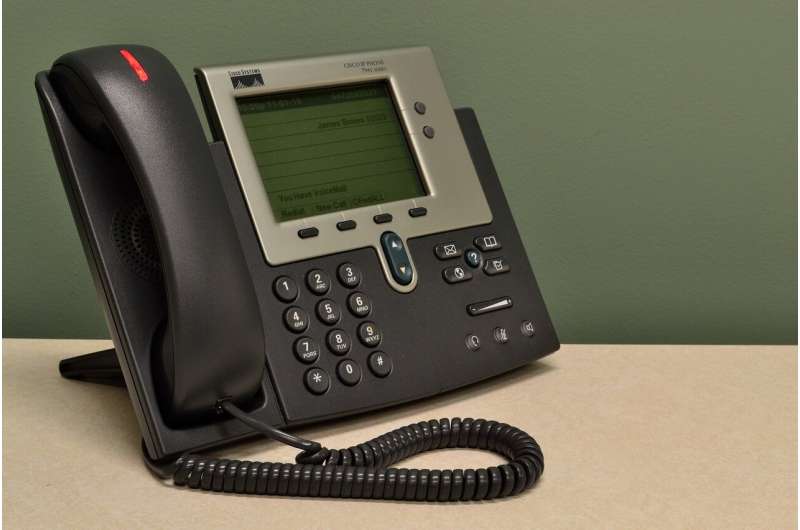Credit: Pixabay/CC0 Public Domain
The Federal Communications Commission issued its largest ever fine of $225 million to Texas telemarketers who sent about 1 billion robocalls falsely claiming to sell health insurance for Aetna, Blue Cross Blue Shield and other companies.
John Spiller and Jakob Mears, who did business under the names Rising Eagle and JSquared Telecom, faced the fine, proposed in June 2020 by the FCC, for massive spamming of spoofed robocalls in the U.S. in 2019. Spoofed calls have a false caller ID that makes them appear to come from a nearby location.
Consumers would be asked if they were interested in "affordable health insurance with benefits from a company you know?" and companies including Aetna, Cigna, Blue Cross Blue Shield and United HealthCare were mentioned.
If they pressed 3 to get an agent, the consumer would be transferred to a call center unaffiliated with any of those insurers. One of the robocallers' largest clients, Health Advisors of America, was sued in 2019 by the the Missouri attorney general for telemarketing violations, the FCC says.
Spiller told the USTelecom Industry Traceback Group, a group authorized by the FCC to investigate robocalls, that he knowingly called consumers on the Do Not Call list, the FCC says. He told the group that his firm made millions of calls per day and that he was using spoofed numbers, the FCC said in its original fine proposal.
In addition to enforcing the agency's largest-ever fine, the FCC also issued several cease-and-desist orders against other robocallers and created a robocall response team.
"Unwanted robocalls are not only a nuisance, but they also pose a serious risk to consumers who can inadvertently share sensitive, personal information in response to bad actors' malicious schemes," acting FCC Chairwoman Jessica Rosenworcel said in a statement. "I'm proud to unveil my first set of actions to put a renewed focus on what the FCC can do to combat the issue that we receive the most complaints about."
The cease-and-desist letters went to six firms charged with making or facilitating robocalls:
- RSCom of Canada, which was warned in May 2020 to cease making scam calls involving COVID-19, Social Security, the Internal Revenue Service, electric utilities and Apple Inc.
- Stratics Networks of Canada for facilitating fraudulent calls about COVID-19, student loans, political campaigns, and discounts and upgrades for AT&T and DirecTV.
- Yodel Technologies, a Florida provider, for facilitating fraudulent calls related to Social Security, health insurance, and debt reduction services.
- Icon Global, a U.K.-based company, for facilitating robocalls that inundated the Washington, D.C., Metropolitan Police Department, as well as those falsely representing Apple and the Social Security Administration.
- IDT Corporation of New Jersey, for transmitting, on behalf of clients, illegal robocalls about COVID-19 and health insurance, Social Security, fictional Amazon refunds, computer services, credit cards, and fraudulent calls threatening to disconnect utilities without payments.
- Third Rock Telecom, of Canada, which is suspected of transmitting robocalls about fictional Apple/iCloud account breaches, Social Security scams, and credit card fraud.
A new Robocall Response Team, a group of 51 FCC staff members, will coordinate anti-robocall efforts. Rosenworcel also sent letters to the Federal Trade Commission, Justice Department, and the National Association of State Attorneys General about anti-robocall collaborative efforts.
"Today's cease-and-desist letters should serve as a warning sign to other entities that believe the FCC has turned a blind eye to this issue," Rosenworcel said. "We certainly haven't and we're coming for you."
More information:
(c)2021 U.S. Today
Distributed by Tribune Content Agency, LLC.
























